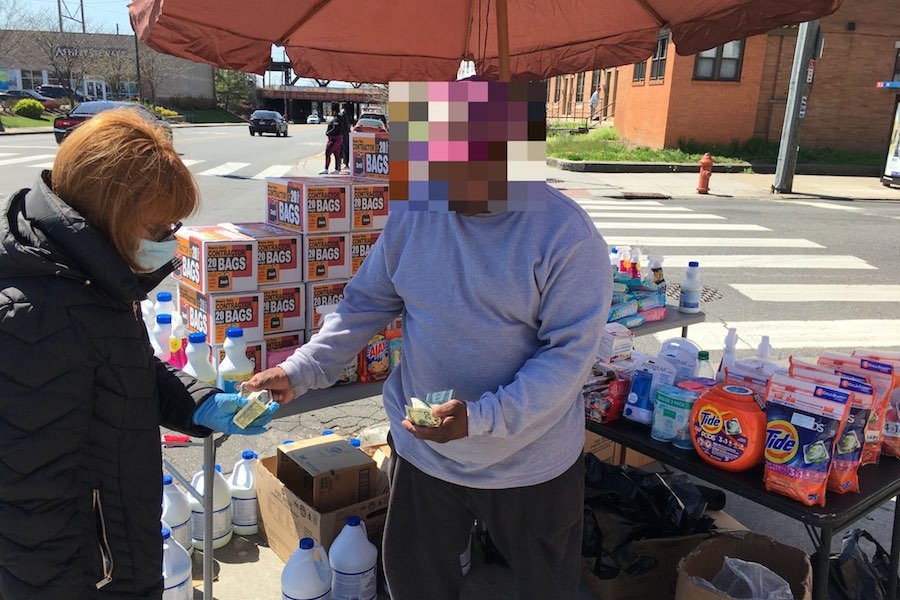No, You Cannot Sell a $2 Bottle of Hand Sanitizer for $19 in Pennsylvania
Price gouging complaints are surging in Philadelphia and across the state.

A street vendor who has been reported for price gouging in Philadelphia during the coronavirus outbreak. We’ve blurred his face in this photo while the Attorney General’s office investigates. The vendor declined to comment for this story.
When the Great Toilet Paper Shortage of 2020 began thanks to the coronavirus, I noticed that a small market near my house had no such shortage. It’s the type of place where they (illegally) sell loosies (a.k.a. individual cigarettes) for $1. The shop had a huge stack of chintzy Scott toilet paper single rolls on sale for 50 cents a roll. I bought four.
One week later, I stopped by the same shop. Apparently, the owner had caught on to the Great Toilet Paper Shortage of 2020. Those rolls had magically become a buck each. Now? It will cost you two dollars to buy one, er, crappy roll of Scott toilet paper at his store.
That, my friends, is price gouging. And price gouging in Philadelphia and throughout Pennsylvania is surging during the coronavirus outbreak.
PA Law Says No to Price Gouging
Here’s what Pennsylvania law has to say about price gouging. There’s actually something called the Pennsylvania Price Gouging Act. And it reads, in part: “It shall be a violation of this act for any party within the chain of distribution of consumer goods or services or both to sell or offer to sell the goods or services… for an amount which represents an unconscionably excessive price.”
That’s the legalese version.
According to Mark Shade, the press secretary for Pennsylvania attorney general Josh Shapiro, it’s really pretty simple.
“Under rules governing a disaster emergency,” explains Shade, “companies and vendors are prohibited from charging a price for consumer goods that exceeds 20 percent of the average price to which those goods or services were sold seven days preceding the date of emergency declaration.”
So, if a disaster has been declared (which it has) and you were selling, say, bread for $3 for the last month, you can’t just go selling it for $3.75 all of a sudden.
About a month ago, back when a lot of us were still living in la la land in terms of the coronavirus affecting our lives in any major way, AG Shapiro announced that his office would actively combat price gouging in the state.
“As Pennsylvania continues to manage the spread of the coronavirus, merchants should be put on notice: you cannot use a public health emergency as a business opportunity,” said Shapiro in a statement. “For consumers, just know: if you see the price of basic goods skyrocket ― reach out to my Office. Let us know. Our agency is here to protect you from being taken advantage of.”
Coronavirus Price Gouging By the Numbers
Since that time, residents have filed 3,735 price gouging complaints, or about 125 each day. And the number keeps growing daily.
The AG’s office won’t name the businesses accused of price gouging, but they did share with us some examples of items in the complaints. Those items include things like eggs, baby formula, hand sanitizer, water, chicken, heart medication, and, yes, toilet paper.
According to Shade, the office is investigating a Philadelphia grocery store accused of selling hand sanitizer for $13. There’s a pharmacy in Levittown under investigation for selling N95 masks for $20 each. Yes, for one mask.
Then there’s the mini-market in Philly that was accused of selling 24-bottle cases of water for $15.99 and adding $4 to a can of Lysol. The AG’s office completed its investigation in that case and found the complaint to be valid. The office issued a cease-and-desist letter to the shop.
The AG’s office also issued a cease-and-desist letter to a store in the Philly suburbs that was selling $2 bottles of hand sanitizer for $19. Forget about merely exceeding the 20 percent legal limit. That’s an increase of 850 freaking percent.
As of Wednesday morning, more than 230 such cease-and-desist letters had been issued by the AG’s office. Should the cease-and-desist letter not work, the AG can take more drastic legal action.
“Taking advantage of consumers in need of food, disinfectant and toilet paper during a global crisis and a state of emergency is not only outrageous, it’s illegal,” Shapiro said earlier this month. “I urge consumers to stay vigilant for instances of price gouging in their communities and report them…”
Beware the Vitamin that Can Kill the Coronavirus
Recently, I heard about a street vendor in Philadelphia (his setup is pictured above), who was selling cleaning and disinfecting products for very high prices. The acquaintance who told me about the vendor reported him to the AG.
When I stopped by on Monday, the (ungloved, unmasked) man was taking money from a (masked) older woman, who bought a bottle of bleach for $8. I found the same bottle of bleach in a nearby store for $3.
Then the vendor, who declined to comment for this story, told a potential customer that he was fresh out of hand sanitizer.
“But I do have these pills over here,” said the vendor, pointing to a box of magnesium oxide, a supplement generally used as an antacid or laxative.
“Will that kill the coronavirus?” the potential customer asked.
“It can definitely prevent it,” said the vendor.
Should you see an example of price gouging, you can file a complaint with Shapiro’s office by emailing pricegouging@attorneygeneral.gov.


